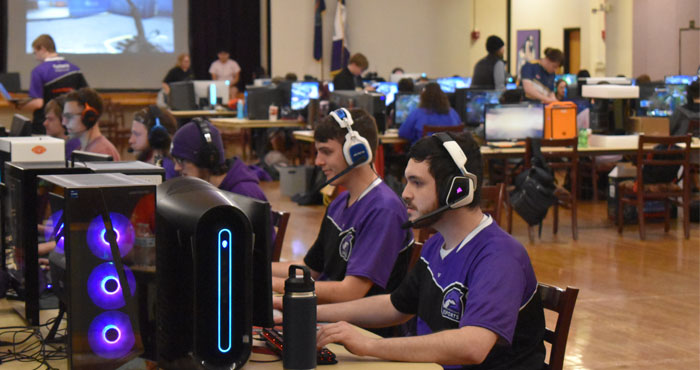esports are a thriving hub for competitive gaming and community building
What started with Pong in the 1970s is now a full-fledged sport. A new generation of athletes don’t run laps or lift weights — instead their fingers fly over a controller at amazing speed and accuracy. What’s this new athletic program at K-State? esports.
This rapidly growing industry is a form of competitive, digital gaming for professional and recreational players. With more than 100,000 high school students competing on esports teams, it is no question that prospective students are looking to continue their esports involvement in college. More than 2,000 U.S. colleges offer competitive eSports programs with scholarships, coaching and institutional support.
Now K-State is ready to join that list.
A growing community
But esports have already made their way to Kansas State University. The 200-member K-State esports club is ranked 4th regionally in League of Legends and recently hosted the Heartland Showdown, a competition with 400+ attendees, in the K-State Student Union Ballroom.
Ever since Juan Bocanegra, a senior studying management information systems and leadership studies, played League of Legends for the first time in high school, he has been an avid esports competitor. Juan now serves as president of the esports club at K-State. While joining the club has allowed Juan to stay involved with one of his favorite hobbies, it has also connected him to others with similar interests and introduced him to his closest friends.
During the pandemic, esports was a great place to foster connection for students. Although recruiting efforts had to take a virtual form, the club still welcomed 20 new members.
“It is amazing how you can connect with people completely virtually and still grow strong connections and friendships without being in person,” Juan said.
The next step in esports offerings
K-State is looking to increase its esports offerings through space renovations, equipment purchases, scholarships, recruitment efforts and coaching. By expanding the program, K-State hopes to provide academic development and a sense of community for students.
“High school students active in esports are evaluating colleges’ esports offerings as a factor in their enrollment decision making,” said Dr. Thomas Lane, vice president for student life and dean of students. “K-State needs to be an active player in this growing field as we are seeing peer institutions begin to develop their own programs.”
Beyond its student recruitment benefit, a state-of-the-art esports program would deliver academic impact: experiential learning opportunities for students in a variety of disciplines. One of these academic opportunities is introducing esports content to the existing Business of Sports and Entertainment certificate, which currently has 150+ students enrolled.
Other benefits associated with esports involvement include:
- Internships with esports-focused companies
- Skill development in STEM fields
- Performance and training benefits
- Opportunities in marketing, computer science, social media, event management and more
Renovations and the vision ahead
Currently, students compete in esports competitions from home, using their own computers and gaming equipment. To purchase the necessary equipment, students often spend around $1,500 each, which creates a large financial barrier to involvement in the club. When competing in tournaments, students bring their equipment with them, often posing challenges in finding a space where everyone can gather.
Support to the esports program includes a space renovation in the K-State Student Union to create a hub for K-State esports teams. The remodeled arena space would feature:
- 42 CPU gaming stations
- 12 console gaming stations
- 1 broadcast booth
“Building a showcase esports facility will not only attract students looking to participate in esports, it will also provide a playing arena for the over 200 students currently participating in the university’s esports club,” Dr. Lane said. “Having a permanent esports arena provides a laboratory for students to connect classroom content related to the ever-growing esports realm.”
Through three phases of implementation, K-State will ultimately be a thriving hub for collegiate esports. Donor support will play a major role in developing esports programming at K-State.
“Philanthropy will be critical in providing the needed resources to renovate space for the arenas, ensure equipment is updated and maintained, and offer scholarships to competitively recruit top esports players,” Dr. Lane said.
To support the K-State esports program contact Evan Jones by email or at 785-775-2078.
Written by Ariana Brancato
